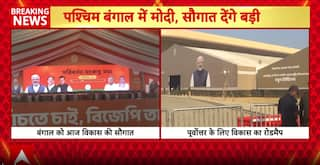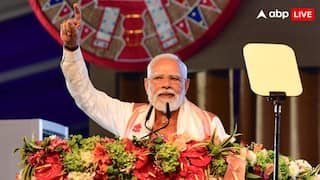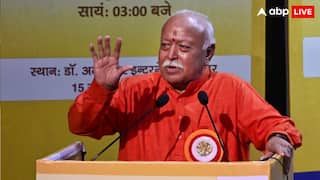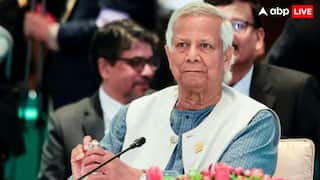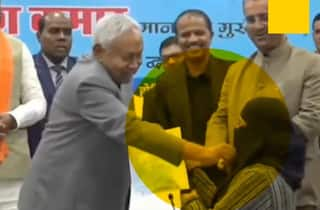Mahatma Gandhi's ideals must continue to guide actions in ensuring peace and stability around the world: Jaishankar
United Nations, Dec 14 (PTI): External Affairs Minister S Jaishankar Wednesday said that as the world grapples with violence, armed conflicts and humanitarian emergencies, Mahatma Gandhi's ideals must continue to guide actions in ensuring peace and stability around the worl.

United Nations, Dec 14 (PTI): External Affairs Minister S Jaishankar Wednesday said that as the world grapples with violence, armed conflicts and humanitarian emergencies, Mahatma Gandhi's ideals must continue to guide actions in ensuring peace and stability around the world.
He made the remarks while jointly unveiling Mahatma Gandhi's bust at a sombre ceremony at the North Lawns of the United Nations with UN Secretary General Antonio Guterres and President of the 77th session of the General Assembly Csaba Korosi.
"Honoured to join UNSG @antonioguterres and @UN_PGA Csaba Korosi in unveiling the bust of Mahatma Gandhi at the @UN Headquarters. May his presence in these hallowed premises inspire the UN to live up to its founding ideals," Jaishankar said in a tweet.
The ceremony was attended by UN Ambassadors and leaders as well as Security Council members. The ceremony also included a soulful rendition of 'Vaishnav Jana To.' The Gandhi bust, a gift from India to the United Nations, is made by renowned Indian sculptor Padma Shree awardee Ram Sutar, who has also designed the 'Statue of Unity’. The bust is the first Gandhi sculpture installed in the UN headquarters, which proudly displays gifts and artifacts from around the world.
"Today, as the world grapples with violence, armed conflicts and humanitarian emergencies, Gandhi ideals must continue to guide our actions in ensuring peace and stability around the world," Jaishankar said in his remarks at the event.
"Conflict and inequality seem an inevitable part of the human condition. Mahatma Gandhi's greatest lesson to the world was that this may not be so. Conflicts can be resolved, and inequalities can be addressed," he added.
He said that as India assumed the presidency of the Security Council this month in its current two-year tenure as elected member, “we dedicate this sculpture of the Father of our nation” - a gift from 1.3 billion people of India to the United Nations.
The minister said the installation of the Gandhi bust at a time when India celebrates the 75th year of its independence, is a tribute to the relevance and universal appeal of the values of the Mahatma.
He said the unveiling of Mahatma Gandhi's bust at the UN is a timely reminder for everyone to follow these ideals better and to create a peaceful world, which is the fundamental object of the United Nations.
"Gandhiji is a symbol of non violence, truth and compassion, is a symbol of peace, a symbol (that) reminds us of our duty to make the world a better place for future generations," he said.
Guterres, in his remarks at the ceremony, thanked the Government of India for its “generous donation” of the Gandhi bust and expressed hope that its installation at the Headquarters of the United Nations “will remind us of the values Gandhi upheld, and to which we remain committed".
"Recognizing that diversity is one of India’s greatest assets," Gandhi “strove for harmonious relations between religions, cultures and communities. The focus of his life was pressing for social and political reform through non-violent resistance, while creating a culture of peace,” Guterres said.
"Gandhi-ji’s anti-imperialist vision was foundational for the United Nations. As the Charter states, our Organization is built on the principle of “equal rights and self-determination of peoples”. Indeed, the drafters of the Charter took great inspiration from Gandhi’s message of peace, non-violence, and tolerance," the UN chief said.
Gandhi’s success in mobilizing millions for anti-colonial resistance, while adhering to the principles of non-violence, inspired people across the world, Guterres added.
Describing Gandhi as “one of the giants of the modern age”, Guterres said Gandhi is not only a historical figure. “His visionary ideas and values, including his concern for justice and social transformation, continue to resonate today." Korosi said that Mahatma Gandhi’s lifelong devotion to building peace and eliminating poverty represents the very essence of the United Nations.
"One of history's most transformative figures, his life philosophy has been a great source of inspiration for more than a century," he said.
"What would he say about our society if he saw the world today? Our wars, conflicts and ridiculous rivalries. The endless violence online and offline. Our inability to keep our pledges, to meet the Sustainable Development Goals. And of course, our failure, at least so far, to unify against climate change and biodiversity loss," he said.
He said Gandhi was a pioneer in his reflection on living in harmony with nature.
"As we face the global threats ahead, let us recall his spirit and his legacy of peace and kindness, towards ourselves, each other, and our planet. Let this bust be a reminder to all of us of how much one person can achieve. Let this bust prove, to use the Mahatma’s own words, that 'In a gentle way, you can shake the world," Korosi said.
"Let it be a symbol of peace and humanity," he added.
Jaishankar highlighted core concepts espoused by the Mahatma - Ahimsa, Satyagraha, Sarvodya and Swaraj, saying these very principles are also enshrined in the UN Charter.
Guterres said Gandhi’s legacy is everywhere, including in the daily work of the United Nations around the world for equality, solidarity and empowerment. He said many of Gandhi’s ideas prefigured the concept of sustainable development - including his view that “poverty is the worst form of violence”. His belief that societies should be judged on their record of uplifting the most vulnerable holds important lessons for today’s leaders.
The UN chief noted that Gandhi renamed those considered “untouchable” as “Harijan” or “Children of God”, and considered the campaign against caste discrimination to be as important as the struggle against colonialism.
Guterres said Gandhi was one of the first to recognize the dangers of the plunder and destruction of the environment, observing that the earth, the air, the land and the water are “not an inheritance from our forefathers, but on loan from our children. PTI YAS/ZH AKJ MRJ
(This story is published as part of the auto-generated syndicate wire feed. No editing has been done in the headline or the body by ABP Live.)













